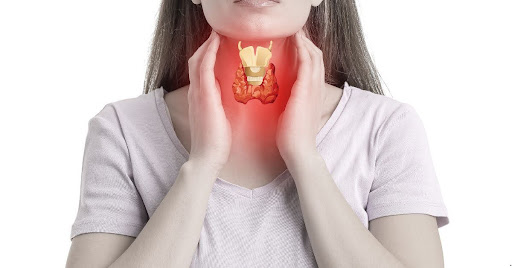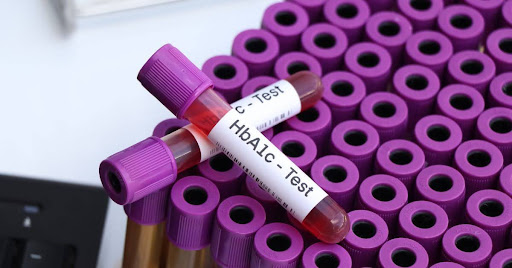Thyroid Health in Women: Normal Hormone Levels and Symptoms to Watch
4 min read
By Docgenie , Published on - 16 March 2025 The thyroid, a small butterfly-shaped gland located in your neck, plays an essential role in regulating the body's metabolism, energy levels, and hormonal balance. For women, maintaining thyroid health is especially important, as hormonal changes during menstruation, pregnancy, and menopause can directly influence thyroid function. Understanding the normal T3, T4, and TSH levels, recognizing symptoms of imbalance, and knowing when to seek help can make a significant difference in overall well-being.
The thyroid, a small butterfly-shaped gland located in your neck, plays an essential role in regulating the body's metabolism, energy levels, and hormonal balance. For women, maintaining thyroid health is especially important, as hormonal changes during menstruation, pregnancy, and menopause can directly influence thyroid function. Understanding the normal T3, T4, and TSH levels, recognizing symptoms of imbalance, and knowing when to seek help can make a significant difference in overall well-being.Understanding the Thyroid Gland and Its Hormones

What Are T3, T4, and TSH?
- T3 (Triiodothyronine) and T4 (Thyroxine) are the main hormones produced by the thyroid gland.
- TSH (Thyroid Stimulating Hormone) is released by the pituitary gland and signals the thyroid to produce T3 and T4.
These hormones control metabolism, body temperature, heart rate, and brain development, particularly important for women during childbearing years.
What Is the Normal Range of T3, T4, and TSH?
T3, T4, TSH Normal Range by Age
- Understanding the T3 T4 TSH normal range in females is crucial for detecting early signs of thyroid imbalance. Although these values can slightly vary by lab, standard reference ranges are:
- TSH: 0.4 to 4.0 mIU/L (milli-international units per liter)
- Free T4: 0.9 to 1.7 ng/dL (nanograms per deciliter)
- Free T3: 2.3 to 4.1 pg/mL (picograms per milliliter)
Normal T3 T4 TSH Levels in Women by Life Stage
- Adolescents (13–19 years): Hormones fluctuate due to puberty; TSH may be slightly elevated.
- Adult Women (20–40 years): Regular menstrual cycles may be influenced by thyroid function.
- Pregnant Women: TSH and T4 levels are closely monitored as both hypothyroidism and hyperthyroidism can affect the baby’s development.
- Postmenopausal Women: Hormonal shifts can mask thyroid symptoms; regular screening is advised.
Is Fasting Required for a TSH Test?

Many people ask:
Is fasting required for the TSH test? The answer is generally no. TSH levels are not significantly affected by food intake, so fasting is not mandatory unless your doctor recommends checking other parameters (like blood sugar or lipid profile) at the same time.Common Thyroid Disorders in Women
- Hypothyroidism (Underactive Thyroid) This condition occurs when the thyroid does not produce enough hormones.
- Fatigue and sluggishness
- Weight gain
- Depression or low mood
- Dry skin and hair thinning
- Irregular periods or infertility
- Hyperthyroidism (Overactive Thyroid) When the gland produces too much hormone, it leads to:
- Rapid heartbeat
- Weight loss despite good appetite
- Nervousness or irritability
- Sweating and heat intolerance
- Increased menstrual flow
- Hashimoto’s Thyroiditis An autoimmune disorder where the immune system attacks the thyroid. It often leads to hypothyroidism and is more common in women aged 30–50.
Symptoms include:
Symptoms include:
Symptoms That Shouldn’t Be Ignored
What Are the Warning Signs of Thyroid Problems?
If you’re experiencing two or more of the following, it's time to consult your doctor:- Unexplained fatigue
- Constipation or frequent diarrhea
- Sensitivity to cold or heat
- Memory or concentration issues
- Swelling at the base of the neck
- Irregular or heavy menstrual periods
Thyroid Testing and Diagnosis
Routine blood tests can help detect thyroid dysfunction early. Commonly recommended:- TSH Test: Most sensitive indicator of thyroid function.
- Free T3 and Free T4 Tests: Measure the active thyroid hormones.
- Anti-TPO Antibodies: Used to diagnose autoimmune thyroiditis like Hashimoto’s.
Why Is Thyroid Health More Important for Women?
Hormonal fluctuations in women make them more susceptible to thyroid conditions. Pregnancy-related thyroid issues can result in miscarriage, premature birth, or developmental issues in the baby if left untreated.Tips to Maintain Healthy Thyroid Function
- Eat a Thyroid-Friendly Diet Focus on foods that support thyroid function:
- Iodine-rich foods: Like seaweed, iodized salt, and dairy
- Selenium-rich options: Such as Brazil nuts, sunflower seeds, and fish
- Zinc sources: Pumpkin seeds, chickpeas, and whole grains
- Excess soy
- Cruciferous vegetables in raw form (broccoli, cauliflower) if you have low thyroid function
- Manage Stress Levels Chronic stress increases cortisol, which can disrupt thyroid hormone production. Practices like yoga, meditation, and mindful breathing can help.
- Ensure Regular Sleep and Exercise Getting 7–9 hours of sleep and staying physically active helps regulate hormonal balance and supports metabolism.




 Between 9am to 8pm
Between 9am to 8pm Whatsapp Message at
Whatsapp Message at support@docgenie.in
support@docgenie.in



